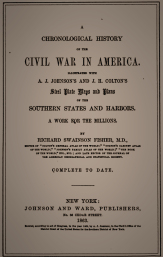
April 21, 1861 A Chronological History of the Civil War in America1 Philadelphia, Wilmington, and Baltimore Railroad taken possession of by the U. S. Government. War sermons preached in most of the Northern churches. A Chronological History of the Civil War in America by Richard Swainson Fisher, New York, Johnson and Ward, 1863
April 20, 1861 Robert E. Lee resigns his commission in the United States Army in order to command the forces of the state of Virginia. Guyandotte (city) calls for the state to approve the secession actions of the Virginia legislature. A Chronological History of the Civil War in America1 Great Union Mass Meeting in New [...]
April 19, 1861 Virginia forces take control of Harpers Ferry A Chronological History of the Civil War in America1 Attack on the 6th Massachusetts Regiment at Baltimore, of which two were killed and seven wounded. Eleven of the rioters killed and many wounded. Baltimore in the hands of the mob, and the mayor informed the [...]

April 18, 1861 Robert E. Lee is unofficially offered command of the thousands of soldiers being called up to protect Washington by presidential adviser Francis P. Blair. Lee immediately refuses.1 Federal forces withdraw from Harpers Ferry Federal marshals seize records of telegraphs sent from major northern cities, leading to the arrest of southern sympathizers. A [...]
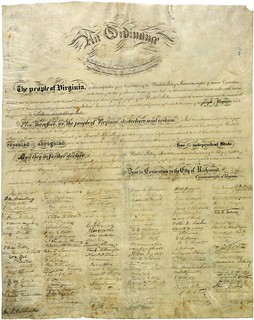
April 17, 1861 The state of Virginia’s secession convention votes to secede from the United States, later becoming the eighth state to join the Confederate States of America. Virgina Secession Convention approves an ordinance of secession and calls for a popular vote to approve it. A Chronological History of the Civil War in America1 The [...]
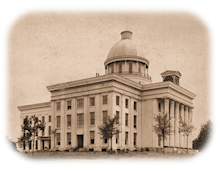
April 16, 1861 The Confederate Congress passes a Conscription Act. Gov. Magoffin, of Kentucky, and Gov. Letcher, of Virginia, refused to furnish troops under the President’s proclamation. Gov. Harris, of Tennessee, and Gov. Jackson, of Missouri, also refused1 Confederate States Government called for 32,600 additional troops.1 A Chronological History of the Civil War in America [...]
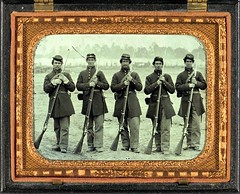
April 15, 1861 President Abraham Lincoln calls for 75,000 volunteers to quell the insurrection that soon became the American Civil War. Braxton Bragg places Lt. John Worden under arrest in Pensicola, Florida, making him the first prisoner-of-war in the American Civil War. Rejecting Lincoln’s call for troops, Tennessee Governor Isham Harris orders a second session [...]
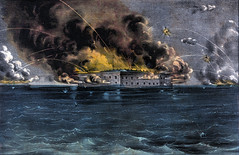
April 14, 1861 During the formal surrender of Fort Sumter Private Daniel Hough dies when the cannon he was loading (for the Union’s 100-gun salute to the U.S. flag) discharges prematurely. He is the first man to die in the Civil War. A second man is mortally wounded. Major Anderson and his men left Fort [...]

April 13, 1861 At 7 A.M. Sumter reopened fire; at 8 the officers’ quarters were fired by a rebel shell; at 10 a chance shot struck down the flag, and at noon most of the wood-work of the fort was burning, and the men rolled out 90 barrels of powder to prevent explosion, and soon [...]

April 12, 1861 Battle of Fort Sumter. The war begins with Confederate forces firing on Fort Sumter, in the harbor of Charleston, South Carolina. Beginning at 4:30 am on the 12th and continuing until the morning of the 13th, Confederate batteries along the shore of Charleston Harbor fire on Fort Sumter under the command of [...]

April 11, 1861 Beauregard demands, by order of the Secretary of War, the unconditional surrender of Fort Sumter. The demand is refused by Major Anderson, his own sense of honor and his obligations to the U. S. Government not permitting compliance.1 A final request would come in the early morning hours of April 12, shortly [...]

April 10, 1861 Floating battery at Charleston finished and mounted Large numbers of troops sent to the various fortifications. A Chronological History of the Civil War in America by Richard Swainson Fisher, New York, Johnson and Ward, 1863

April 9, 1861 U. S. steamers “Illinois” and “Baltic” sailed from New York with sealed orders. President Davis makes a requisition for troops. A Chronological History of the Civil War in America by Richard Swainson Fisher, New York, Johnson and Ward, 1863

April 8, 1861 Official notification given that supplies would be sent to Fort Sumter by force if necessary. State department declined to recognize the C. S. commissioners. A Chronological History of the Civil War in America by Richard Swainson Fisher, New York, Johnson and Ward, 1863

April 7, 1861 P. G. T. Beauregard orders all transports to Fort Sumter cut off. This ended the fort’s supply of fresh food Gen. Beauregard notified Major Anderson that intercourse between Fort Sumter and Charleston city would no longer be permitted.1 Steam transport “Atlantic” sailed from New York with troops and supplies.1 A Chronological History [...]

April 6, 1861 Lincoln dispatches a State Department employee to inform South Carolina Governor Francis Pickens that the federal government will re-provision Fort Sumter. The president makes it clear that no additional troops will be sent to the fort if supply ships are allowed to land, but that if the effort is resisted the fort [...]

April 5, 1861 South Carolina State Convention ratified the Constitution of the Confederate States (146 v. 16, 10 absent). A Chronological History of the Civil War in America by Richard Swainson Fisher, New York, Johnson and Ward, 1863
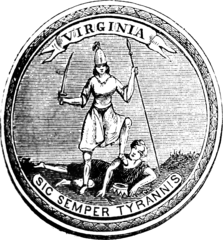
April 4, 1861 Legislature of Kentucky ratified the amendment1 to the Federal Constitution passed by Congress.2 Virginia State Convention refused, by a vote 89 to 45, to submit a secession ordinance to the people. 2 A proposed 13th Amendment to the Constitution that was never ratified, the Corwin Amendment, which would shield “domestic institutions” of [...]

April 3, 1861 A “test vote” in the Virginia convention shows a 2-1 margin against secession (Union) Long cabinet meeting on the Fort Sumter business–great activity in the navy department.1 Rebel battery on Morris Island, Charleston Harbor, fired into a schooner.1 A Chronological History of the Civil War in America by Richard Swainson Fisher, New [...]

April 1, 1861 – U. S. Tariff Act went into operation.1 A Chronological History of the Civil War in America by Richard Swainson Fisher, New York, Johnson and Ward, 1863
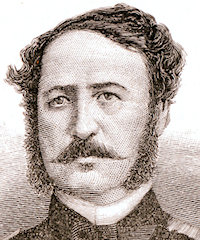
March 31, 1861 General John Bankhead Magruder reassigned from Arkansas to Texas.

March 29, 1861 After days of deliberation and careful consultation with his cabinet, Lincoln decides to re-supply Forts Sumter and Pickens. In an 89 to 45 vote, the Virginia State Convention rejects an ordinance of secession. Mississippi ratifies the Confederate Constitution

March 21, 1861 Provisional Vice-President of the Confederate States of America, Alexander Stephens, gives the Cornerstone Speech. Missouri secessionist convention adjourns having voted 98-1 against secession
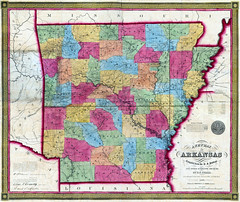
March 18, 1861 By a vote of 39-35 the Arkansas convention defeats a secession motion. Instead, they vote to hold a general election in August to determine the question of secession.
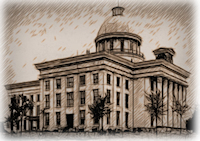
March 16, 1861 Confederate Provisional Congress creates the Confederate Marine Corps. It never numbers more than 600 members and its records are destroyed intentionally near the end of the war Edwin Vose Sumner promoted to Brigadier General and given command of the Department of the Pacific, replacing Albert Sidney Johnston














